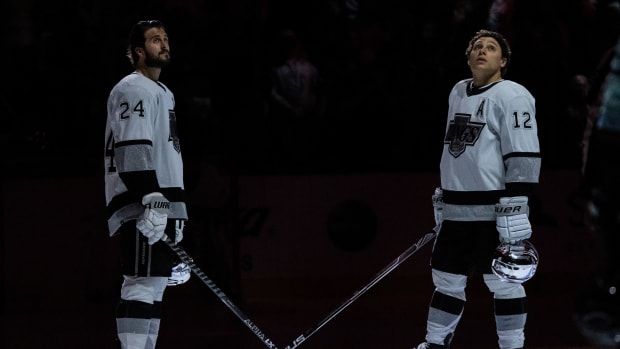This is the newest file in THN.com’s ongoing “Three Burning Questions” series, in which we ask three noteworthy questions for each NHL team prior to the 2022-23 regular season. In this particular file, we pose Three Burning Questions about the Los Angeles Kings.
THREE BURNING QUESTIONS FOR THE KINGS IN 2022-23:
1. Can L.A. continue its upward trajectory? After failing to make the playoffs in the three previous seasons – and missing out on the post-season five times in the seven previous years – the Kings finally had a respectable year in 2021-22, finishing third in the Pacific Division and nearly knocking off the Western Conference-finalist Edmonton Oilers in a seven-game first-round showdown. The progress validated the direction GM Rob Blake chose to take the franchise in. but this is a “what-have-you-done-for-me-lately?” league, meaning there will be considerable blowback in Los Angeles if the Kings fail to build on that success this season.
Blake has brought back, in essence, the same roster that took a competitive jump last year; the biggest difference will be the presence of marquee off-season acquisition Kevin Fiala. The former Predators/Wild winger put together a 32-goal, 85-point season for Minnesota last season, and he’ll be playing on L.A.’s top line (alongside center Anze Kopitar and winger Adrian Kempe), so there’s reason to believe Fiala will equal or better those individual numbers in 2022-23.
It’s important to remember this Kings team is a young team – only one of their top-12 forwards (the 35-year-old Kopitar) is 30 or older – and competition in the Pacific will increase thanks to the improved Anaheim Ducks and Vancouver Canucks. Nothing is going to be given to the Kings. But if those young players continue their positive development, and they get a healthy, productive year out of their key veterans, there’s no reason why this L.A. team shouldn’t make the playoffs and win at least three games once they get there.
2. About those key veterans – what’s realistic for the Kings’ thirtysomethings? At all three areas of their lineup, the Kings have veterans anchoring things: at forward. Kopitar plays the most (with a 20:46 ice time average); on defense, 32-year-old star Drew Doughty averaged more ice time (25:44) than the next-most-utilized D-man (Matt Roy, at 20:59); and in net, 36-year-old Jonathan Quck appeared in 46 games, nine more than 27-year-old Cal Petersen appeared in. On the surface, having a trio of thirtysomethings as your cornerstone players is not ideal, although there is something to be said for the experience and knowhow brought to the table by players of Kopitar’s, Doughty’s and Quick’s ilk.
In addition, it’s not like Doughty, Kopitar and Quick had a clear drop in their overall play. Injuries limited Doughty to 39 games, but other than that, the three two-time Stanley Cup-winners provided Kings head coach Todd McLellan with a solid base to build a new generation of elite-level talent. The problem is the amount of salary cap space the trio takes up – this season, a whopping $26.8 million (per CapFriendly.com). Quick’s salary comes off the books next summer, and Kopitar’s deal expires at the end of the 2023-24 campaign, but for now, Kings brass needs all three veterans to remain at the standard they played at last season.
There’s nobody in the franchise who can replace what they bring if they’re injured, and there are very few teams that’ll be willing or able to add Doughty or Quick if L.A. were to make them available. In sum, they’re stuck with one another, and the Kings can’t afford to have them not regularly contributing if they’re to get to the second round of the playoffs and beyond.
3. Is Phillip Danault one of the best second-line centers in the game today? The short answer here is, “absolutely, he is.” The 29-year-old thrived last season, his first as a King after signing a six-year, $33-million contract; in 79 games, Danault demolished his previous personal best in goals-scored by generating 27, and for the second time in his seven NHL seasons, he was a 50-point-producer
Danault’s two-way game makes him stand out among NHL second-liners, and his defensive play in L.A. last year was just what the doctor ordered for this growing Kings squad. At $5.5 million, he’s a bargain, but the Kings expect big things from him again this year, and there’s no reason to suspect he’ll fail to come through for them.



